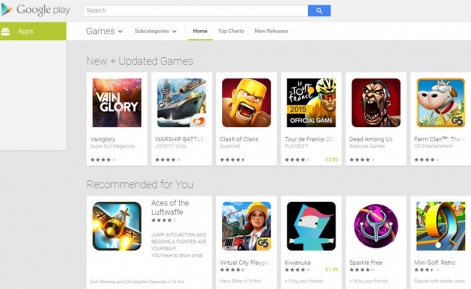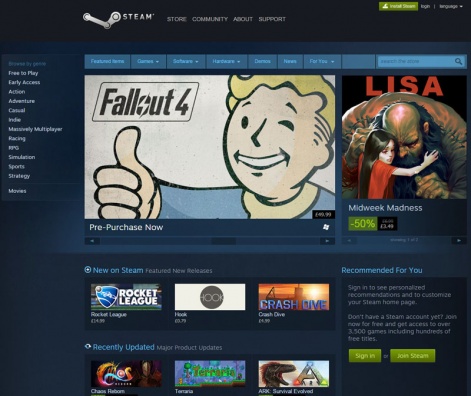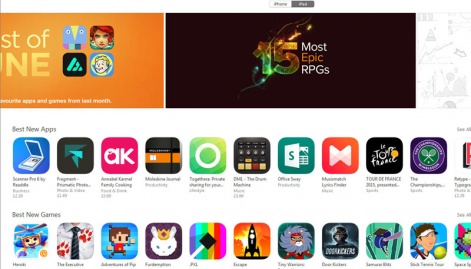It now appears like a brief summer storm on the Mississippi, but it wasn't that long ago that Apple was pulling games from the App Store for displaying a flag.
Developers were forced to change artwork and resubmit their games, generating a lot of stress, potential loss of income and highlighting, once again, the iron fist that Apple wields.
Broadening out the topic, we asked our Indie Mavens:
"In your experience, which digital store's game submission and update approval systems are the most hassle? How could they be improved?"
"Does the ease and flexibility of these process affect your platform approach?
Can you perhaps be swayed by exclusive promotion deals such as Apple's featured games on its App Store to prioritize a platform?"
As a mobile developer on iOS and Android, we approach updates on the Play Store and App Store quite differently because of their submission processes.
So far we've never been rejected by Apple's approval process but it's the time it takes to get approval that has the biggest impact for us. With approval taking anything from a few days to a couple of weeks, it means that we're very reluctant to push out non-essential updates to iOS as they demand such a lot of testing to make sure there are no problems.
If we find a bug once the update is out, we know it might take another week or two to get the fix pushed out to everyone.

Whereas, with the Play Store, we know that if we do have any problems we can get another update out within a couple of hours. Knowing this, it means that we will always prioritise getting the Apple build completed first as we can continue to tinker with the Google Play build whilst we're in the App Store queue.
As for what could be improved, it's a good thing that Apple have an approval process but it would be great to have a fast-track system on the App Store whereby games which have a proven track record can get through the queue much quicker.
Maybe there is one and we've just not been invited!
The Mac OSX App Store is quite easily the most hassle of any system I've used. In fact, it was such a ballache getting a Unity game signed properly for the store, I eventually just delisted my games from there. Sales numbers didn't justify the hassle every time I wanted to do an update.
The Mac OSX App Store is quite easily the most hassle of any system I've used.Richard Perrin
Steam, on the other hand, is fantastic. It was a bit fiddly to setup at first but now I just click one button and all my different platforms update nicely.
Ultimately which platforms I make my games available on is a pretty simple formula of hassle to update versus revenue generated. Even if Steam was a nightmare I'd stick with it because it makes most of my money.
Console submission is a whole other story, of course. The initial technical requirements approval process is a nightmare beyond belief. My advice to anyone doing console work is if your game doesn't absolutely need online features don't do it.
I published games through Steam, Play store and iTunes. Steam Manager is the smoothest solution, with proper revisions that are not trying to update the whole game everytime you're publishing something.

Apple submission process is long, very long, with tricks and traps for the newbie. For example, games with an ad library not displaying ads will be rejected: it’s fair, but these libraries could be attached without the dev knowing.
Steam Manager is the smoothest solution.Francois Alliot
I suspect this process is by design as much as for reviewing purposes. Make it more difficult for developers to submit games and you prevent them from using iTunes Connect as a test environment where you publish new build every five minutes.
I don’t have improvements to suggest. I fear Apple features will never be granted *before* you actually publish something…
I wouldn’t count on that one.
For me it has to be the iOS approval system, as it can take really long and especially for the initial release this can be disastrous, as you have to plan press releases (for which you need the latest version of your game for reviews) and be able to determine a fixed release date.
Should a crucial update fail, you might have to delay the game in the last minute. Of course these effects can be avoided with the right approach, but still there remains a lot that can go wrong.
If there's one thing I really like about Google Play it's that between uploading a new build and it going live it takes only a few hours. That way you can react quickly if something goes wrong (e.g. you overlooked a bug or introduced a new one with the update).
What I don't like about their setup is that once you uploaded a new version, you cannot go back to the old one, which would've really helped when I accidently broke something. Again, this is something that can be avoided with proper testing, but humans make mistakes and it's the job of the stores to help avoid as many of them as possible.
I’ve only experienced the iOS App Store and the GooglePlay Store so far. In my opinion both of these stores have their pros and cons. iOS has it’s review system that can make reacting to critical bug fixes a real pain, if you can’t get an expedited review.
On the other hand, setting up a game and the whole process before uploading it is absolutely well designed in terms of user experience. On the Google Play store you have virtually no review time, but the process of setting up your game is a pure user experience nightmare. Due to it’s oneness, it’s an absolute hassle to do the simplest things, like signing your app and so on.
I definitely value the ease of use of a system over its popularity.Arnold Rauers
If I would want to improve the process of approval on the iOS store maybe I would prefer a second step in between, where an automated process would pre-check the app and would give you immediate feedback if it would pass a real review. Since most of the common mistakes could be avoided before waiting 10 days to get rejected within a two minute review.
I definitely value the ease of use of a system over its popularity. Since Apple is providing a way better experience getting a game onto the users devices, I would always favor their system even if it means I have to obey to sometimes intransparent rules of their walled garden.

I think that the general make-up of the stores is pretty similar with regards to submission, update and approval. The only big differentiator is approval time. Google Play takes a few hours. Amazon and Windows Phone around half a day and iOS about a week (generally). Apple is the standout case.
While a short submission turnaround can be great for pushing out quick fixes, I'm not sure that it's that critical, certainly not for the all important first release.
My biggest gripe with all of the stores is localisation.Peter Akehurst
Apple's system encourages you to have a robust testing strategy. You make sure the app is tested as thoroughly as possible, by as many people as possible, on as many different devices as possible. You try to make it so that a submission failure is as remote a possibility as it can be.
With the other stores things tend to be a bit more lax; you can be a bit more click-happy with the submit button safe in the knowledge that you can always just submit again.
Personally, my biggest gripe with all of the stores is localisation. With Storm Rush I decided to release in 19 languages. There's not much text in the game so it seemed like a simple way to increase downloads. However, 19 languages means 19 app descriptions, 19 sets of keywords and 19 sets of images; everything must be edited or uploaded individually.
For Google Play that meant going through the image upload process 342 times. All in all it took a week of pasting text and uploading images to complete the process for the four stores; I can't wait to do my next update! A bulk uploader for store data is a must in my opinion.

Heikki Repo is a Co-Founder and Creative Director of the game company Cornfox & Brothers Ltd. The company established in 2010 is best known for their adventure game Oceanhorn: Monster of Uncharted Seas (2013) and the Death Rally (2011, 2012).
Heikki enjoys plotting stories and making videogame art. He is a huge fan of storytelling and believes that every element of a videogame can be used to evoke emotions and deliver drama. Because of his non-stop creative nature, he works in many roles in game development.
I'd like to turn the question around and praise Steam's update process! There is no approvals and update can go live as soon as build has been uploaded to Steam servers.
If something goes wrong with the build and there is a bug we couldn't find in QA, we can immediately upload a fixed build to Steam. On other platforms, getting the fix for the players would take days...
Steam is hands down the winner here.
Steam is hands down the winner here.Dan Menard
It is very easy with Steam to put out new versions, have a beta stream that players can join and roll back versions if there is a problem.
Google Play does all this pretty well, but it is more of a hassle to setup. iOS with the manual approval process is very painful to work with and really limits your ability to respond to customers quickly.
I don't have any experience with the consoles yet, but I hope they take a page from Valve's book and just make it as easy as possible.
Along with all of the previously mentioned reasons Google Play is less of a hassle than the iOS App Store, I'd like to add a big personal grievance of mine: that Apple requires unique screenshots and video trailers in aspect ratios for all of its devices (store goers will only see materials provided that match their iPhone or iPad).

By comparison, for Google Play all you need is a set of screenshots taken from a phone, another set that shows what the game looks like on tablets, and a YouTube link to a trailer (something every dev probably already has made).
Apple's requirements make tons of extra headache because you may have captured some great screenshots or made an awesome trailer for one device, but, unless you can edit the aspect ratio, you'll have to capture all new footage or screens for every other device.
However, in my experience, it's much more difficult to get attention and features on the Play Store without paying Google. Thanks to an App Store feature, the vast majority of our sales and downloads came from iOS, making all of the difficulties in submission worth while.
I have only worked with the App Store and Google Play and I would have to give the nod to the Google Play store submission process. I can personally attest to the difference in approval time, while Google Play just takes a couple hours, I have waited around 25 days to hear back about an update for the App Store.
The two stores are a bit different in the way they display reviews for updates. In the App Store your app by default will only display the reviews and ratings for the most recent version. The user has to choose to see the combined reviews for all the versions.
I found the ability to comment on reviews in Google Play to be very helpful.Sebastian Gosztyla
Though I don't know if this makes a difference to sales or downloads, I personally tend to be drawn to apps with more reviews when I'm browsing the App Store.
Google Play ratings and reviews are accumulated and don't distinguish between versions. Because of this and the quick turnaround time I tend to update more often on Google Play. I could see this leading to more lazy updates with less robust testing, but I think ultimately this benefits the users since there's little reason not to make small tweaks and updates.
To be fair iOS tends to require less updates because the devices don't have as many differences as the fragmented Android market, which in my case leads to more issues for each specific device.
I found the ability to comment on reviews in Google Play to be very helpful. Quite a few times I was able to reply to reviews suggesting fixes and features once I got them implemented in a update.
On the other hand if someone points out a bug or requests a feature on the App Store, there is no way to inform that customer that a fix was made or that the feature was added in an update. I think it helps to foster a bit of a community by allowing developers to respond to customer issues or feedback.






























